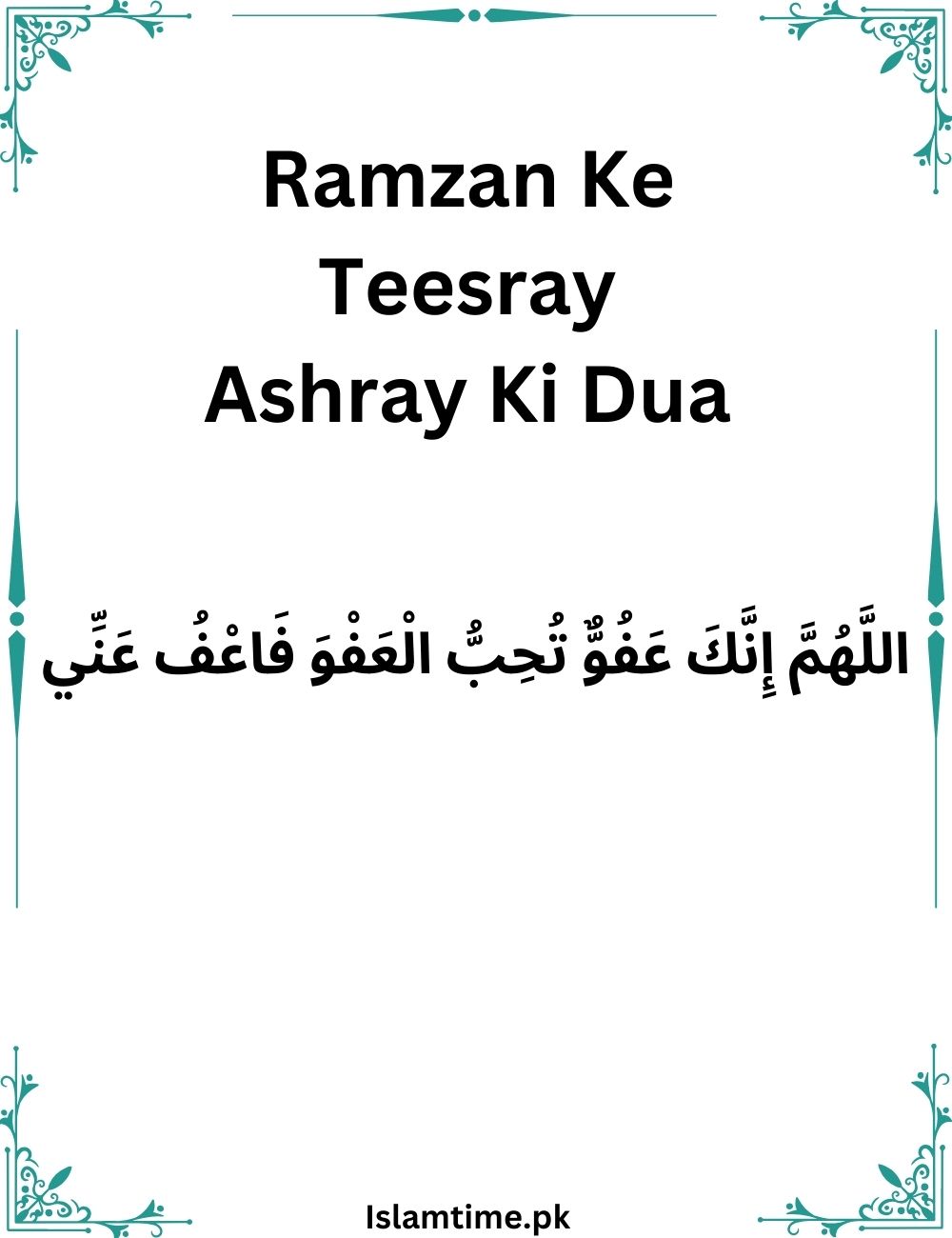Ramadan Ke 3rd Ashra Ki Dua In Arabic With Urdu Translation (رمضان المبارک کے تیسرے عشرہ کی دعا عربی میں، اردو ترجمہ کے ساتھ)

“Ramzan ke teesray (last) ashray ki dua” is also known as “Allahumma Innaka Afuwwun Dua“refers to the supplication made during the third ashra (last ten days) of the holy month of Ramadan. These ten days are considered the most blessed and spiritually significant period of Ramadan. The dua associated with this ashra is:
"Allahumma innaka 'afuwwun tuhibbul 'afwa fa'fu 'anni"
Ramadan Last Ashra Dua in English
"O Allah, You are the One who pardons greatly, and You love to pardon, so pardon me."
Ramzan ke Teesray ashray ki dua in Arabic
اللَّهُمَّ إِنَّكَ عَفُوٌّ تُحِبُّ الْعَفْوَ فَاعْفُ عَنِّي
Ramzan ke 3rd Ashra ki Dua With Urdu translation (رمضان المبارک کے تیسرے عشرہ کی دعا اردو ترجمہ کے ساتھ)
یا اللہ! تو بہت بخشنے والا ہے اور بخشش کرنے کو پسند کرتا ہے، تو مجھے بخش دے۔
During the last ten days of Ramadan, Muslims intensify their worship and seek forgiveness, mercy, and blessings from Allah. The dua of the third ashra encapsulates the essence of seeking forgiveness and pardon from Allah. It acknowledges Allah’s attribute of pardoning and emphasizes the love and desire for forgiveness that Allah possesses.
Detailed Breakdown
- Allahumma (اللَّهُمَّ): This is an invocation directly addressing Allah, the Almighty. It is a form of calling upon God with deep reverence and earnestness.
- Innaka (إِنَّكَ): This means “indeed You” or “verily You,” affirming the certainty and exclusiveness of the attribute that follows, which in this case is the attribute of forgiveness.
- Afuwwun (عَفُوٌّ): This is one of the beautiful names of Allah, meaning “The One Who Pardons”. It signifies Allah’s attribute of forgiving and wiping away sins completely, as if they never existed.
- Tuhibbul-afwa (تُحِبُّ العَفْوَ): This means “You love forgiveness.” It indicates that not only does Allah forgive, but He also loves to forgive His servants. This love for forgiveness shows Allah’s immense mercy and compassion.
- Fa’fu anni (فَاعْفُ عَنِّي): This is a direct plea to Allah, meaning “so forgive me.” The supplicant is asking Allah to pardon their sins, erase their mistakes, and grant them mercy.
Significance
- Laylat al-Qadr: This dua is particularly recommended during the last ten nights of Ramadan, with an emphasis on Laylat al-Qadr, the Night of Decree. This night is better than a thousand months and is a time when prayers are believed to be especially potent and likely to be accepted.
- Forgiveness and Mercy: The essence of this dua is seeking Allah’s forgiveness. It reflects a deep recognition of human fallibility and the need for divine mercy. It also acknowledges Allah’s love for forgiving His creation, thereby instilling hope and comfort in the hearts of believers.
- Spiritual Reflection: Reciting this dua encourages self-reflection and repentance. It is a reminder to the believer to turn towards Allah with sincerity and humility, seeking His pardon for past transgressions and striving to improve in faith and actions.
Benefits of Reciting “Allahumma innaka afuwwun tuhibbul-afwa fa’fu anni” Dua (دعا کی فضیلت)
Reciting the dua “Allahumma innaka afuwwun tuhibbul-afwa fa’fu anni” offers several key benefits like:
- Directly asks for Allah’s forgiveness, cleansing the soul from sins.
- Instills hope through Allah’s love for forgiveness
- Symbolizes the removal of past mistakes, offering a fresh start
- Enhances trust in Allah’s mercy
- Encourages humility and recognition of one’s need for Allah’s mercy.
- Attracts numerous blessings, including increased provision and protection from hardships
- Reciting this dua during Ramadan’s last ten nights, especially on Laylat al-Qadr, brings immense rewards
Summary
The dua of the last ashra in Ramadan is a powerful supplication that holds immense significance. It allows us to seek forgiveness, purification, and blessings during the final days of Ramadan. By reciting this dua, we strengthen our connection with Allah and strive for spiritual growth. May Allah accept our supplications and shower His mercy upon us in this blessed period of Ramadan.